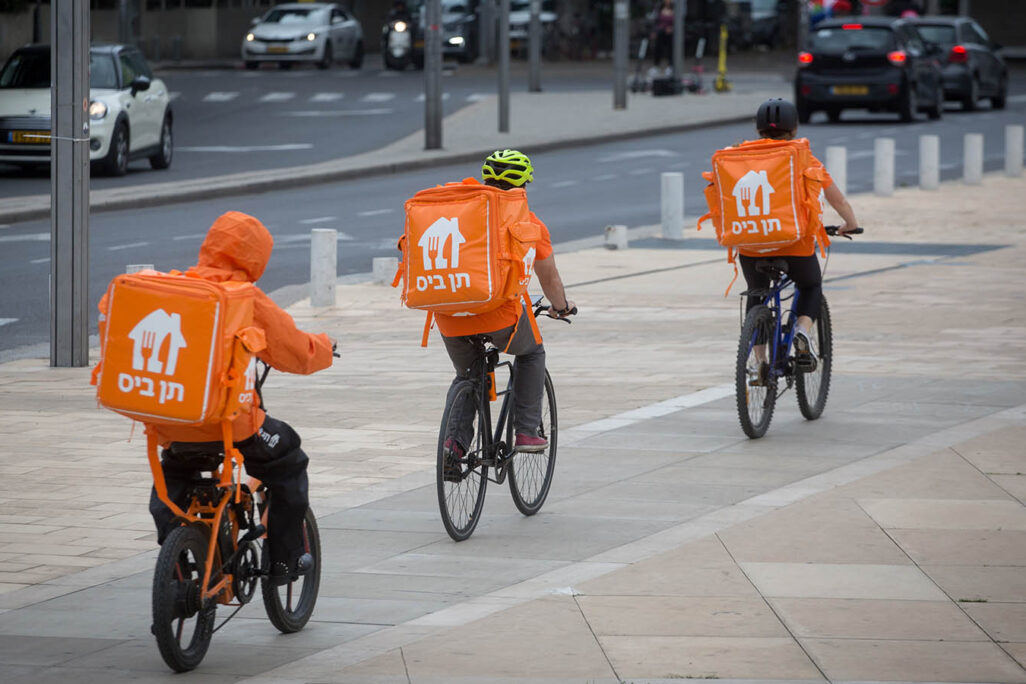
This week, 1400 bicycle couriers in Israel chose to unionize. They demand that their employer, a popular food delivery app, provide accident insurance and overtime pay.
Their employer is 10bis, which roughly translates to “give a bite.” The company partners with Israeli high tech firms and restaurants to offer speedy food delivery. 10bis hired hundreds of new employees in recent months, as food orders increased during coronavirus lockdowns that shuttered restaurants.
According to the couriers who deliver that food, conditions are dangerous.
"The company does not finance any type of insurance,” says Adam Steiner, 33, a leader of the unionization effort. He added that the company requires couriers who ride scooters to cover the cost of “courier insurance” themselves.

According to a survey of 10bis couriers that union organizers conducted, 22 percent of respondents experienced an accident during work.
“Last February, I had an accident while delivering, an accident that took me out of work for about two months," says Roni Astrax, one of the lead organizers. According to Astrax, 10bis delayed filing paperwork that would have allowed him to receive government support while he recovered.
“I'm a young guy who rents an apartment and finances himself,” he says. “I had to take out a loan so that I could pay my rent in those two months, a loan I’ve just finished paying back.”
Another courier, who chose to withhold his name, was injured while delivering for 10bis on a bicycle.
"Suddenly an Egged minibus overtook a truck and hit me. I accidentally dislocated the patella of the knee and shoulder,” he says. His requests to be transferred to a different position at 10bis were ignored.
“I keep working on the bike, even though a knee dislocation is a hell of a pain. I still take painkillers,” he says. “The occupational therapist told me ‘there is no way you keep working like this,’ but I owe money. My knee now suffers from recurrent dislocations, every time it happens I put it back in place. It's excruciating pain, and it has happened to me several times during or after work.”
In the last week, more than half of 10bis employees joined the Histadrut, forming a new union. Organizing efforts have ramped up in recent weeks. A social media campaign launched on October 19th.

The workers are now demanding that the company enter into collective bargaining negotiations. First and foremost, they are demanding an insurance mechanism to protect themselves when they are injured.
They are also demanding that tips be counted as part of their salary, so that they can receive overtime pay commensurate with what they earn. They’re also demanding that 10bis regulate delivery distances, guarantee a minimum number of work hours, and provide basic welfare conditions.
Shuki Rocha, 43, has been working as a courier for over a year. “If there is one thing that bothers me, it is the attitude towards us employees,” he says. “All the management sits in their offices and treats us as if we are transparent. I expect humane treatment.”
Some workers see the 10bis unionization campaign as a way to fight back against the exploitation that many workers suffer in the so-called “gig economy.” Apps providing a range of services have taken off in Israel in recent years, but workers, often defined as “independent contractors,” are offered few protections and obstacles to unionization.
In other countries, app-based couriers have won the right to unionize only after winning the right to be re-classified as employees, not independent contractors. 10bis is somewhat unique as an app-based delivery service, since workers are already defined as employees. They are directly employed by Scuber, a 10bis subsidiary in Israel and are owned by Just Eat Takeaway, a Dutch company.
Adi Lehavi, 24, has been a courier for 10bis for six months. "We are in an age of economic instability,” he says. “People are looking for fair employment. I joined the committee to ensure working conditions are safe for the couriers, and to regulate the courier market in Israel.”
According to a statement from 10bis, the company will respect its workers decision to join the union, but did not comment on the workers’ allegations. “The decision whether or not to join a workers' union is a personal choice of the employee and we will respect it,” the statement reads.






